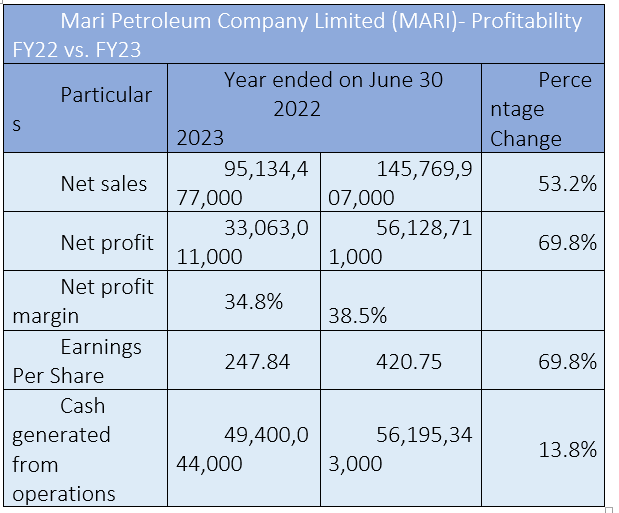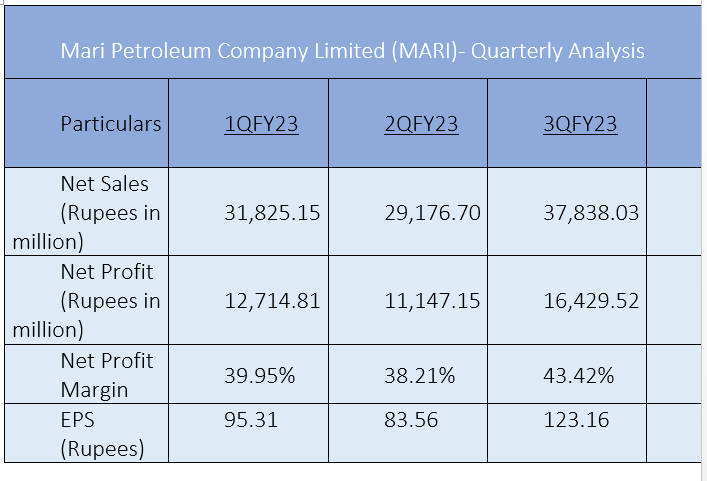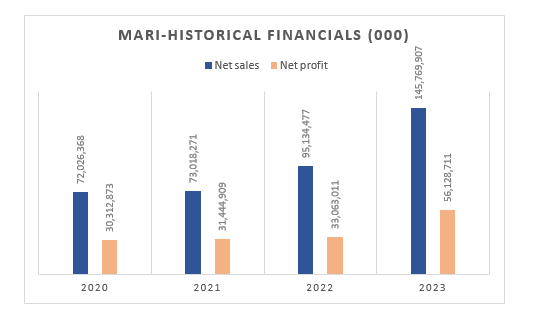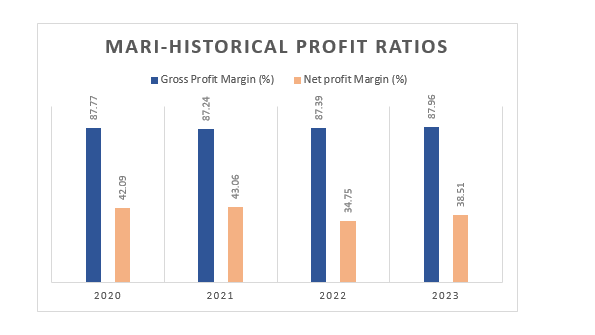INP-WealthPk
Ayesha Mudassar
Mari Petroleum Limited (MARI) achieved impressive growth in the fiscal year 2022-23 as the company's revenues and net profit increased by 53.2% and 69.8%, respectively, compared to the previous fiscal year, according to WealthPK. In FY23, MARI achieved the highest-ever sales of Rs145.7 billion due to higher applicable oil and gas prices. The company posted a net profit of Rs56.13 billion, thus resulting in a net profit ratio of 38.5%.

In comparison to the corresponding period of FY22, the oil exploration company showed a 53.2% increase in revenues, pushing sales from Rs95.13 billion to Rs145.77 billion. Likewise, the net profit cranked up by 69.8% from Rs33.06 billion to Rs56.13 billion in FY23. The earnings per share (EPS) value moved from Rs247.84 to Rs420.75 in the period under review. The cash generated from operating activities also increased by 13.8% in a year. Registered on Pakistan Stock Exchange (PSX) with the symbol 'MARI', the company is the second-largest in the oil and gas exploration sector with a market capitalisation of Rs214.8 billion.
Its top competitors include Oil and Gas Development Company Limited, Pakistan Petroleum Limited and Pakistan Oilfields Limited. The company contributed Rs73.75 billion to the national exchequer in the form of royalties, taxes, levies and duties. Indigenous production of natural gas, crude oil and liquified petroleum gas (LPG) by MARI helped curtail the country’s fuel import bill by over $3 billion during FY23.
Quarterly Review
Quarterly analysis reveals that the fourth quarter (April-June) of FY23 contributed the most to the consolidated yearly financials of MARI. The company made the highest net sales and net profits in this quarter. The Q4 profit would have been much higher had there been no imposition of an additional 6% super tax, which was enacted towards the end of the year. MARI posted high profitability ratios and enjoyed profit-making in all the four quarters of FY23. In the first quarter (July-September) of FY23, the company posted net revenue of Rs31.8 billion and a net profit of Rs12.7 billion. In 1QFY23, the oil company reported an EPS of Rs95.31.

In the second quarter (October-December), the company posted net revenue of Rs29.2 billion and a net profit of Rs11.1 billion. Therefore, the net profit ratio was reported to be 38.2%. In 2QFY23, the company reported an EPS of Rs83.56. The decline in sales was mainly the result of exogenous factors like emergency shutdowns and turnarounds of fertiliser plants. In the third quarter (January-March), the company hit net sales of Rs37.8 billion and net profit of Rs16.4 billion. Thus, the net profit ratio was calculated at 43.4%. In 3QFY23, MARI posted the highest quarter-based EPS of Rs123.16. The recently-ended quarter (4QFY23) posted net sales and net profit of Rs46.9 billion and Rs15.8 billion, respectively.
Performance over four years
Analysis of MARI shows that in the last four years, its sales kept increasing. The company posted the highest four-year sales in 2023 at Rs145.7 billion.

In terms of net profit, MARI hit the highest four-year net profit in 2023 at Rs56.12 billion. The company posted net profit of Rs30.31 billion in 2020, Rs31.44 billion in 2021, Rs33.06 billion in 2022 and Rs56.12 billion in 2023.

In the last four years, MARI posted the highest gross profit ratio of 87.9% in 2023. The company reported the highest net profit ratio of 43.1% in 2021 followed by 42.1% in 2020. Profitability ratios have improved in the recently-ended fiscal year as compared to the previous year due to an increase in profit on account of enhanced net sales.
Credit: INP-WealthPk













